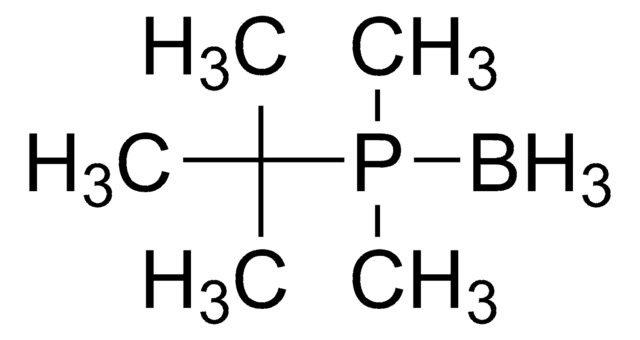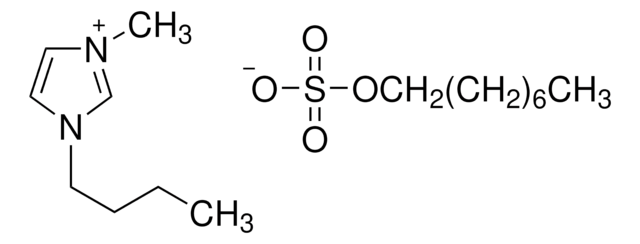690708
1-Decyl-3-methylimidazolium tetrafluoroborate
≥96.5% (HPLC)
Synonym(s):
[C10MIM][BF4]
Sign Into View Organizational & Contract Pricing
All Photos(1)
About This Item
Empirical Formula (Hill Notation):
C14H27BF4N2
CAS Number:
Molecular Weight:
310.18
MDL number:
UNSPSC Code:
12352100
PubChem Substance ID:
NACRES:
NA.22
Recommended Products
Assay
≥96.5% (HPLC)
form
liquid
impurities
≤0.3% water
refractive index
n20/D 1.438-1.450
SMILES string
F[B-](F)(F)F.CCCCCCCCCCn1cc[n+](C)c1
InChI
1S/C14H27N2.BF4/c1-3-4-5-6-7-8-9-10-11-16-13-12-15(2)14-16;2-1(3,4)5/h12-14H,3-11H2,1-2H3;/q+1;-1
InChI key
QGUMDWFYJYXDTH-UHFFFAOYSA-N
Application
1-Decyl-3-methylimidazolium tetrafluoroborate is an ionic liquid, which can be used as:
- A clathrate hydrate crystal inhibitor in drilling fluid.
- A microextraction solvent in the determination of synthetic dyes in foods and cosmetics.
- A substrate in the host-guest inclusion complexation studies with β-cyclodextrin.
Storage Class Code
10 - Combustible liquids
WGK
WGK 3
Flash Point(F)
Not applicable
Flash Point(C)
Not applicable
Personal Protective Equipment
dust mask type N95 (US), Eyeshields, Gloves
Certificates of Analysis (COA)
Search for Certificates of Analysis (COA) by entering the products Lot/Batch Number. Lot and Batch Numbers can be found on a product’s label following the words ‘Lot’ or ‘Batch’.
Already Own This Product?
Find documentation for the products that you have recently purchased in the Document Library.
Customers Also Viewed
Evaluation of 1-Decyl-3-Methylimidazolium Tetrafluoroborate as clathrate hydrate crystal inhibitor in drilling fluid
Saikia T and Mahto V
Journal of Natural Gas Science and Engineering, 36, 906-915 (2016)
Determination of Brilliant Blue FCF in food and cosmetic samples by ionic liquid independent disperse liquid--liquid micro-extraction
Guo J, et al.
Analytical Methods : Advancing Methods and Applications, 5(16), 4021-4026 (2013)
Inclusion complexation of imidazolium-based ionic liquid and beta-cyclodextrin: A detailed spectroscopic investigation
Banjare MK, et al.
Journal of Molecular Liquids, 302, 112530-112530 (2020)
Multi-spectroscopic investigation on the inclusion complexation of alpha-cyclodextrin with long chain ionic liquid
Banjare MK, et al.
Carbohydrate Research, 107982-107982 (2020)
S Mitra et al.
European biophysics journal : EBJ, 48(2), 119-129 (2018-11-27)
The large number of potential applications of ionic liquids (ILs) requires an understanding of their environmental impacts including their adverse effects on microorganisms living in soil and water. The molecular mechanism of toxic activities of these liquids is yet to
Our team of scientists has experience in all areas of research including Life Science, Material Science, Chemical Synthesis, Chromatography, Analytical and many others.
Contact Technical Service














